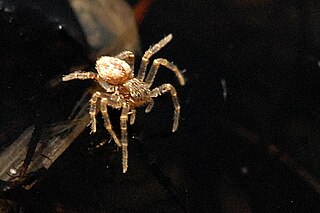
Chipmunks are small, striped rodents of the family Sciuridae. Chipmunks are found in North America, with the exception of the Siberian chipmunk which is found primarily in Asia.

The sharp-shinned hawk is a small hawk, with males being the smallest hawks in the United States and Canada, but with the species averaging larger than some Neotropical species, such as the tiny hawk. The taxonomy is far from resolved, with some authorities considering the southern taxa to represent three separate species: white-breasted hawk, plain-breasted hawk, and rufous-thighed hawk. The American Ornithological Society keeps all four species conspecific.

The eastern chipmunk is a chipmunk species found in eastern North America. It is the only living member of the chipmunk subgenus Tamias, sometimes recognized as a separate genus. The name "chipmunk" comes from the Ojibwe word ajidamoo, which translates literally as "one who descends trees headlong."

The typical striped grass mouse is a small rodent of the suborder Myomorpha in the family Muridae.

Ceruchus is a genus of stag beetles in the family Lucanidae. There are about 19 described species in Ceruchus.

Hyalopsocus is a genus of common barklice in the family Psocidae. There are about six described species in Hyalopsocus.

Trapezonotus is a genus of dirt-colored seed bugs in the family Rhyparochromidae. There are about 19 described species in Trapezonotus.
Microcholus striatus is a species of flower weevil in the beetle family Curculionidae. It is found in North America.
Microcholus is a genus of flower weevils in the beetle family Curculionidae. There are at least four described species in Microcholus.

Pseudosermyle is a genus of walkingsticks in the family Diapheromeridae. There are more than 20 described species in Pseudosermyle.

Blepharidopterus is a genus of plant bugs in the family Miridae. There are about nine described species in Blepharidopterus.
Ceruchus striatus is a species of stag beetle in the family Lucanidae. It is found in North America.
Neochodaeus striatus is a species of sand-loving scarab beetle in the family Ochodaeidae. It is found in North America.
Oropus striatus is a species of ant-loving beetle in the family Staphylinidae. It is found in North America.
Lordotus gibbus is a species of bee fly in the family Bombyliidae.
Lordotus striatus is a species of bee fly in the family Bombyliidae.
Leptipsius striatus is a species of root-eating beetle in the family Monotomidae. It is found in North America.

Dolomedes striatus is a species of nursery web spider in the family Pisauridae. It is found in the United States and Canada.
Dendroterus striatus is a species of typical bark beetle in the family Curculionidae. It is found in North America.

Thanatus striatus is a species of running crab spider in the family Philodromidae. It is found in North America, Europe, Turkey, a range from Russia, and Central Asia.










